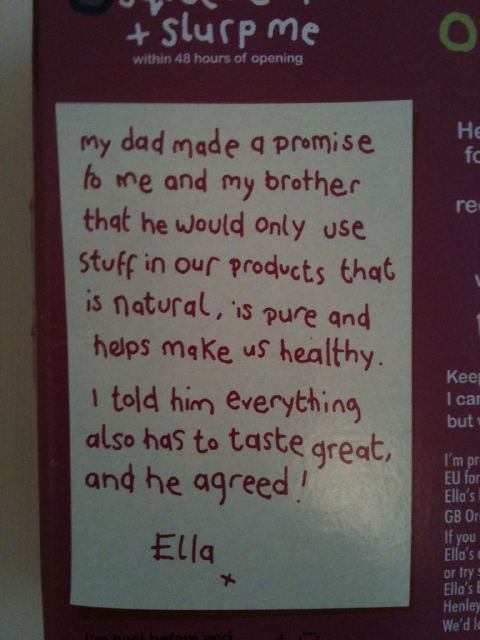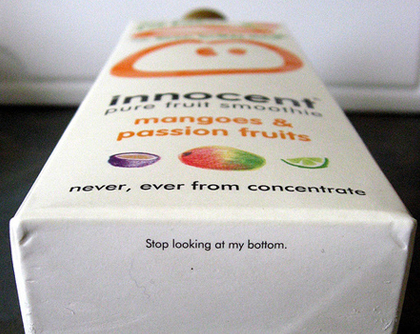As well as instructing consumers to store products in cool, dry places, food labels themselves are often rather dry. So when UK smoothie company Innocent Drinks first used their label space to speak directly to consumers in familiar language, replacing ingredient lists with pictures and hiding jokes on the bottom of the tetrapaks, it seemed like a breath of fresh air.
For Steve Osborn, consultant at Aurora Ceres, the trend responded to consumer mistrust of chemical-sounding ingredient lists and unknowable corporate companies.
“When Innocent started this it was brilliantly innovative and tongue in cheek. At a time when consumers didn’t trust food manufacturers or didn’t know what was in their food, Innocent set out to be open and transparent and [communicate] in a way the consumer could understand," he said.
For Tussie Collier of brand packaging company Hurricane Design Consultants, it was also a good use of space to cultivate brand image.
“This type and style of language ... uses packaging as a permanent part of media communication,” she said.
From humble to hip…to hackneyed?
The origins of wackaging are authentic enough – Dan Germain, creative director at Innocent and the company’s first ever employee, told FoodNavigator that when he started there was no agency to write copy for the company. The familiar language reflects the language they used themselves.
But the trend was copied by countless others, and the backlash quickly followed as the language suddenly seemed inauthentic.

The word 'wackaging' was coined and a website appeared with consumers sending in the most cloying examples of packaging copy and collectively laughing – laughing at the corporate attempts to be consumers’ best pals and not with them.
It’s a typical story of an adoption curve evolution, and for Collier wackaging is well beyond the early majority stage, leaving room only for the laggards.
But she also pointed out that bad publicity was good publicity – and if wackaging still existed 15 years down the line it was because it still worked.
“It makes a connection with the consumer. And at the end of the day all brands are trying to do is connect with the consumer, engage with them and hopefully achieve brand loyalty.
“If the consumer hated it it would come off in a matter of days as it would be reflected in sales!”
Opening the door to abuse?
For Osborn, however, wackaging may have a darker side.
“On a legal label declaration you need to explain the content in a certain way by clearly stating ingredients in a list form – [Innocent] did it pictorially.
“… Of course nobody really minded because they weren’t trying to mislead the consumer but it does create an opportunity for other manufacturers to bend the rules."
By pictorially representing the healthy ingredients and listing the rest, he said that some manufacturers could use novelty labelling to mislead consumers by making a quick comparison between two products harder.
So if wackaging has reached its peak, what will be the next innovation in brand communication? Osborn predicted even greater clarity for consumers by standardising the way information is presented - something that front-of-pack labelling is already doing.
Collier said that creativity and imagination would continue to dictate which new products made it into the 10% of successful product launches, but added that trying to predict specifics was a big ask.
And until then, wackaging may still have a few jokes up its sleeve.

Images from wackaging.tumblr.com
